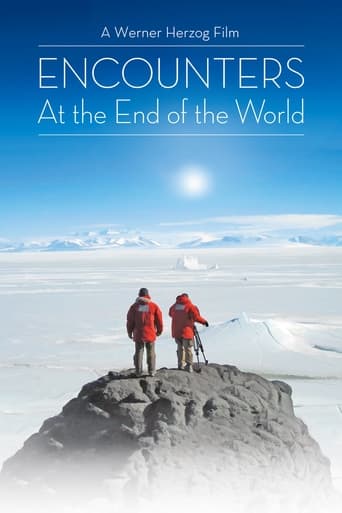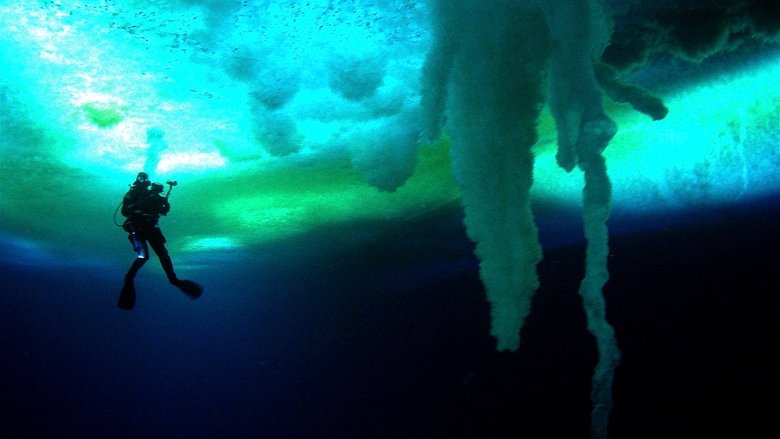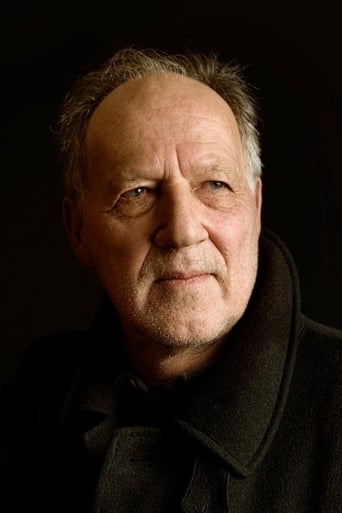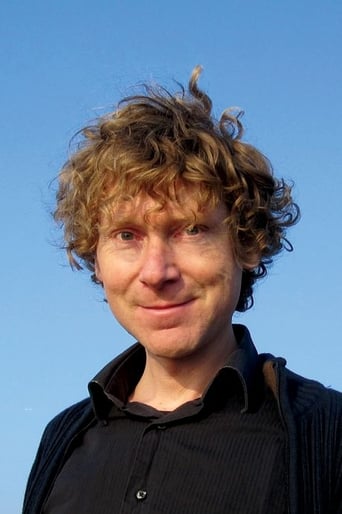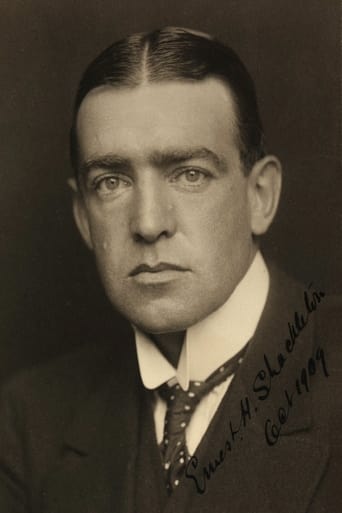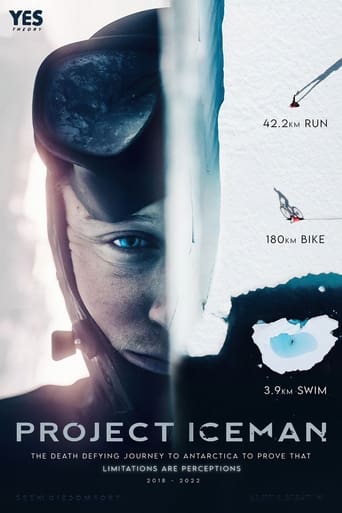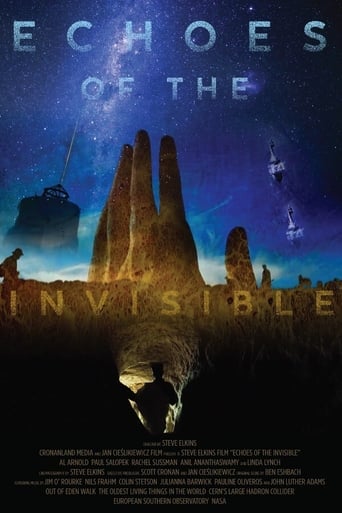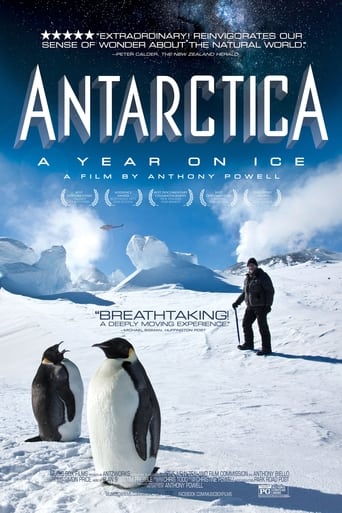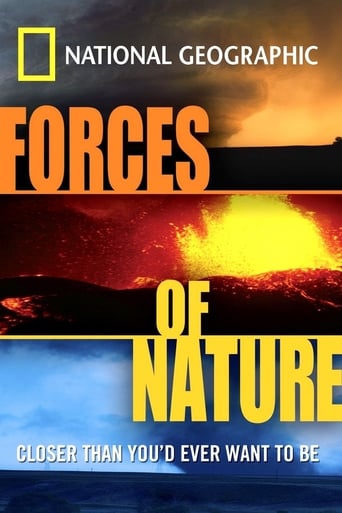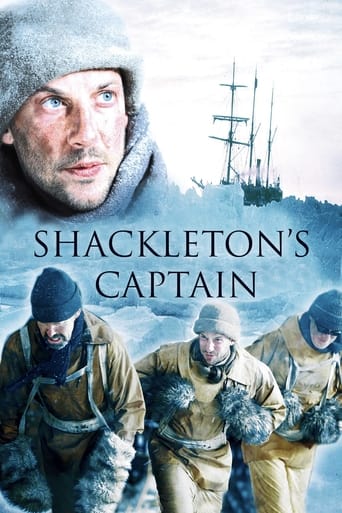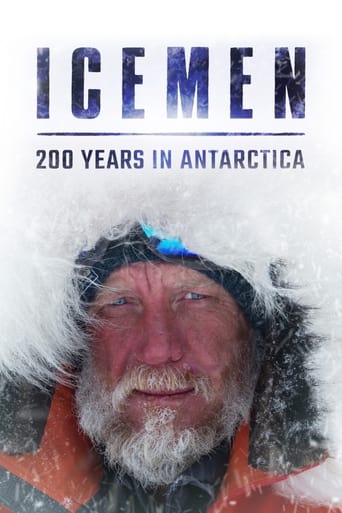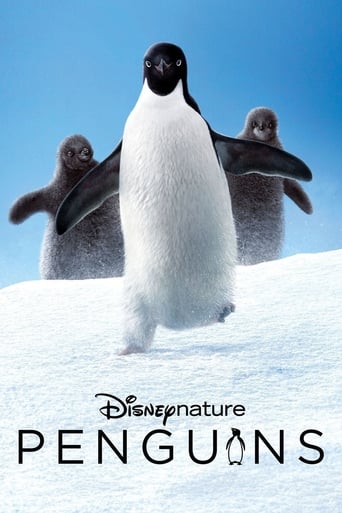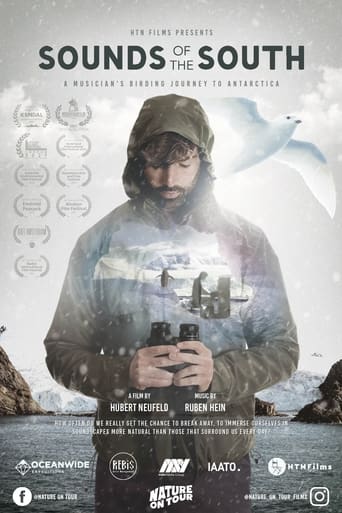Encounters at the End of the World (2007)
Herzog and cinematographer Peter Zeitlinger go to Antarctica to meet people who live and work there, and to capture footage of the continent's unique locations. Herzog's voiceover narration explains that his film will not be a typical Antarctica film about "fluffy penguins", but will explore the dreams of the people and the landscape.
Watch Trailer
Cast
Similar titles
Reviews
So much average
Absolutely the worst movie.
The film creates a perfect balance between action and depth of basic needs, in the midst of an infertile atmosphere.
After playing with our expectations, this turns out to be a very different sort of film.
Herzog is one of few I trust to snap my eye open with just an image, he's done it a few times by this point. When he won't, he will still intrigue, invite me to swims unknown. He has powerful intuitions, will venture where the ground trembles with disorder and once there is spontaneous enough to let it climb up through the soles of the feet.It's a German kind of duende that colors his world; the urge or passion a singer cannot quite put to words and responds to with song. I may disagree with him on conclusions of that duende about the cosmos and the futility of endeavor, but I trust him as explorer and soul.He's in Antarctica here, another desolate landscape outside of maps that beckons in a most primal way. It's where Scotts and Shackletons wrecked themselves, and why. He enters as as anyone else might these days; by plane, one more sleepy traveler among dozens. If you know a bit about him, you will observe a few things.He is pleased to find McMurdo base looking like a drab construction site with machinery tearing up the ground, confirming his views of a fundamentally wretched humanity that fouls the earth. He is as pleased to find a forklift operator on the scene who very poetically describes his presence there as a desire to fall off the edge of the world. It's why Herzog has been in most places.He is enormously pleased to find that all Antarctica newcomers must be drilled on white-out conditions by wearing buckets on their heads and stumbling after each other while tethered to a rope. You can almost feel his exhilaration when they have to reach a certain point in this state but find themselves in a jumble in the opposite direction.He includes a tidbit about researchers studying seals, extracting milk from the mothers while claiming they want to be able to study the animals in their natural state. It mirrors Herzog's own endeavor of perturbing to extract truth about it. He tickles us with these researchers; the milk is being collected for studies on weight-loss.He has the researchers lay down with their ear pressed to the ice, harking for calls of seals from below that sound like Pink Floyd (which are artificially edited on top of the scene). There is a whole world down there that ebbs and calls. It's the world Herzog has sought to portray.An oceanologist had previously explained that the Antarctica - standing for a broader cosmos - is not a big, inert slab of ice as thought in Shackleton's time but an organic entity that is rippling out change. He mentions icebergs the size of Texas that will one day head north, saying this with a mad glint in the eye.He finds an entry into that world below via divers. He gives us fluorescent jellyfish undulating in eerie blue silence. This world is constant struggle, one of the divers confirms. The link is made to a precarious humanity, perched on the outer layer of unfriendly chaos, this time via sci-fi movies.So far we haven't had ecstatic truth of the kind which he favors. He finds it in a disoriented penguin that heads inland towards certain death all by himself. I have still only described parts, there is more to see. It points altogether to a certain cosmology.Yes, he has constructed on the way, intruded upon the subject, made it a point to include the bits we have while omitting others. You can imagine that he has sifted through a lot of otherwise unexciting footage. He has staged most of what you'll see. You can tell how well he has (or not) by noting that he first encountered the lone, intrepid penguin and then went back to set it up by filming the exchange where he asks the penguin researcher about insanity among penguins. It couldn't have taken place the other way.I would disagree in parts, or with the temerity of the physicist who explains on camera about neutrinos as coming from another dimension. It's up to us anyway to choose how to perceive ourselves and our struggle, the universe neither cares nor doesn't. It simply provides the building blocks and vistas. But he's a trusted explorer with good intuitions and here's why. This isn't the natural world of Koyannisqatsi, fundamentally pure and being imbalanced by us. Herzog finds a world with disorder and transience built right in, and welcomes the fact. He's more spiritual than he would admit.
Werner Herzog joins a group of scientist on a plane from New Zealand to McMurdo Station in Antarctica. He interviews the bus driver, forklift driver, and various people in this strange lifestyle. They put a bucket on his head to simulate white-out conditions. He goes to film seals with researchers. The underwater world is otherworldly with the ethereal music. The clams swimming is eye-opening. This is not a penguin movie but there are still penguins in it with a penguin researcher. There is also a volcano with a volcanologist. Herzog is able to deliver the wonder of the place and the wonder of the people drawn to that place. It's a study of the location but also a study of humanity. It's a travelogue unlike most and from someone with a genuine curiosity.
By: Savannah Bristow 06.02.2016 Film Review of Encounters at the End of the World, 2007, 99 min 5 StarsThe duality and mystery of the great white desert known as Antarctica is of interest to many, but Werner Herzog took his curiosity to the next level. Who would be so bold to venture out into a largely untouched land? What draws these adventurous nomads to the "End of the World?" What species occupy the seemingly unlivable continent? These questions are all addressed in Herzog's film, Encounters at the End of the World." The film begins with Herzog's journey to McMurdo Station, home to the National Science Foundation and some 1000 researchers and other inhabitants. Herzog's mission is to uncover the mystery that is life in Antarctica. He juxtaposes the strange yet beautiful natural anomalies he finds with interviews and experiences of the humans that find themselves a part of the madness that is the real "land down under." The people interviewed in this film all have something in common—they were willing to pack up and leave everything behind in order to discover something few will discover in their lifetimes. This is what Herzog and his viewers find so interesting, and the film delves into the question of why. Nature, human or Mother, is the source of all questions posed by this film. Herzog compares the animal, plant, and human kingdoms throughout the documentary in hopes of identifying their typically overlooked similarities. He speaks to many different people that call the continent home in order to get a grasp on their propensity to survive, a trait that the flora and fauna of Antarctica knows all too well. In my opinion, Herzog does an absolutely stunning job of portraying Antarctica for what it is—a complex and ever-changing story of life and its mysteries. He develops a sense of viewer trust and intrigue in the interviewees in a matter of moments, a talent that takes some films hours to develop. Calming scenes of the frigid yet beautiful ocean and never-ending snow caps leave the viewer with a sense of yearning for travel and adventure. Exotic and fascinating accounts from the inhabitants of the continent allow the viewer to feel a need for connection to the culture that the researchers, physicists, botanists, and other settlers of the forgotten land have created for themselves. Antarctica was never a place that I dreamed of exploring endlessly until I saw Herzog's documentary. Now, there is something inside of me that is excited by the possibility of visiting a place that very few will get the chance to see in their lifetime. I now wish to experience the land that is so full of complexity and mystery, known by all as Antarctica. Herzog uses visual and emotional techniques to evoke that sense of longing from the viewer. Scenes of a quiet, uninhabited, pure land make the viewer consider uprooting their own life to venture into the great unknown. Then, a juxtaposition is made with wind, whiteouts, and constant sun that show the viewer a vibrant and lively side of the continent that further instills excitement in the viewer. This duality presented by Herzog is what made me so invested in the film and curious to learn more. There are so many contrasting aspects of Antarctica that allow for a clearer view of its intricate and complicated nature. Herzog juxtaposes scenes of massive icebergs with no visible end in sight with with minuscule microorganisms that are invisible in another sense. He allows for a simpler view of the continent by explaining that there are so very few residents of the land, none of which are permanent, yet makes the land again seem complicated by delving into the scientific or otherwise educational motivation behind these non-permanent residents. This constant contrast between light and dark, snow and sun, human and nature, allows us to see that Antarctica is a metaphor for life itself. By connecting the continent and the nature that composes it to humanity, Herzog forces the viewer to see that our planet is a living breathing being that deserves the utmost respect. His constant comparison of the humans that live in Antarctica to the wildlife that call it home makes their relation a visible and more believable one. Keeping planet Earth healthy and vibrant isn't always on the forefront of humanity's agenda, yet Herzog makes the topic vital and time-sensitive. Earth is the sole provider to all of humankind, and without its resources human life would cease to exist. This inconvenient yet nonetheless accurate fact is overlooked at every opportunity by many, but Herzog's brave documentary brings this truth to light. Werner Herzog presents his documentary, Encounters at the End of the World, as a complex and intricate study of the mysterious continent known as Antarctica. He emerges his viewers into a world of duality and convolution in order to prove that Antarctica is a symbol for life on Earth, for both humans and nature, and that these two are not as different as they are typically perceived to be. Herzog allows his viewers to see the similarities between themselves and nature through accounts of the people that live in the great white desert and scenery of the breathtaking landscape they call home. The direction that Encounters at the End of the World has taken, though surprising, was enjoyable through and through. I give this movie a rating of 5 stars because I believe that no better approach has been taken to address the conundrum that is Antarctica. A must watch!
With ENCOUNTERS AT THE END OF THE WORLD, Werner Herzog has once again delivered a compelling nature documentary, this one exploring life and death in Antarctica. While I didn't love it quite as much as GRIZZLY MAN or THE WHITE DIAMOND - it seems less focused, less passionate about the subject matter - this is still essential viewing for those who want to learn more about our world. And for fans of the director, of course.The man vs. nature theme is present and correct here, as well as unusual creatures; the ones on display here are mainly made up of undersea beasties and some mentally ill penguins. Along the way, Herzog introduces us to the kooky characters inhabiting McMurdo station, and takes us up the slopes of Mount Erebus to get a look inside an active volcano. The cinematography is as clear and crisp as ever, and the narrative is thoroughly engrossing, so I wasn't disappointed, but I wasn't moved to tears here as in the other two productions I mentioned.
